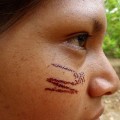西班牙安达鲁西亚省的部落客,自拍关于西班牙对加泰隆尼亚省排外的批评影片,最近在网路上爆红。
部落客Mel Domínguez(@focusings),在2013年4月8号在Youtube channel上传自己对于西班牙人反加泰隆尼亚的影片(video),到目前为止已经超过两百万人点阅,和三万五千则留言。
影片灵感来自于西班牙和加泰隆尼亚省关系紧绷的时期。经济危机横扫伊比利亚半岛,加泰隆尼亚独立运动受到支持,这让加泰隆尼亚和西班牙其它省份的紧张气氛愈来愈浓。
来自西班牙南部韦尔瓦(Huelva)二十三岁的Mel Domínguez,目前在巴赛隆纳住了两年。在影片 “¡A mí me hablas en español!”(麻烦跟我讲西班牙文!)中,她打破了大家对加泰隆尼亚人的迷思:
影片一开始她宣称:
我反对西班牙人只是因为讨厌而讨厌加泰隆尼亚人,我也反对加泰隆尼亚人对西班牙人抱持同样的仇恨态度。
她声称在安达鲁西亚省的家乡,从小就被灌输对加泰隆尼亚人的仇恨以及加泰隆尼亚是西班牙的痛,但当她搬到巴塞隆纳时,她愈来越觉得他们要求政治独立是有依据的:
渴望自己的土地有能力独立成一个国家是有干扰到他人吗?只要他们不要太过激进对西班牙说长道短,我完全尊敬他们的想法……当我愈长愈大,愈认识加泰隆尼亚,我发现这种互相仇恨是很蠢的。
Mel Domínguez同时也打破其他对于加泰隆尼亚的迷思,例如西班牙人在加泰隆尼亚会受到边缘化和歧视,以及加泰隆尼亚语是西班牙的方言。
Mel Domínguez说她小时候很想要看加泰隆尼亚语的电视节目“Crackòvia”时,常和她爸爸起冲突,她父亲说:“要我看加泰隆尼亚语节目,我宁愿看英语节目。”。Mel Domínguez认为这种激进的态度是种“因为他是加泰隆尼亚”的仇恨态度。她最后在影片说:
我知道录这影片也不能改变世界,但我只是想发泄我的情绪罢了。
网路社群的反应
Mel Domínguez原本以为只会有正反两面的反应,但她没料到会受到广大的回响。自从上传影片之后,就不断受到许多的支持,加泰隆尼亚的插画家Joan Pasqual在她的YouTube用加泰隆尼亚语说
嘿,真替妳的聪明才智、同情心和幽默感感到欣慰。谢谢妳让我今天都有好心情,要是西班牙有愈来越多人和妳有一样想法,那就太好了。谢谢妳。
律师Sergi Atienza用加泰隆尼亚语在推特上(Tweet)说:
@SergiAtienza_: 一股民主和受尊敬的气息从西班牙飘散出来。祝福妳和妳的家人。 @focusingshttp://dlvr.it/3D9Z87 @catalanofobia
然而,尽管Mel Domínguez有澄清她对反激进主义的立场,但不免受到某些反对者的人身攻击。值得注意的是,对影片反对的人也愈来愈少了。
Víctor García Glez在推特上说
@uvejeje:“加泰隆尼亚恐惧症”是我今年看过最愚蠢最可悲的影片。恭喜她。
有些网友,像是推特使用者Santiago Sánchez(@murcianista77)甚至怀疑她对民族的忠诚度
@murcianista77: 傻子,如果妳是安达鲁西亚人,那妳就不能是中立的。因为真正的安达鲁西亚人是反分离主义的。
除了社群网站之外,许多报章媒体例如国家报(El País)和媒体(8 TV)都报导Mel Domínguez的影片。西班牙先锋报 ( La VanguardiaLa Guardia)甚至做成独家报导。
为反反加泰隆尼亚发声
影片为反反加泰隆尼亚发声,在加泰隆尼亚引起了很大的回响。为了彰显加泰隆尼亚的民族和文化优越感,在传统的加泰隆尼亚独立日(Diada holiday)和去年夏天引起争议的加泰隆尼亚语的推特使用介面,激进份子都在公开或私底下,大反西班牙对加泰隆尼亚的仇恨。
除了Mel Domínguez的影片之外,知名的网站Apuntem.ca,收集和分享反对者的推特和部落贴文,来谴责反加泰隆尼亚运动,引起许多的回响。
A YouTube video featuring an Andalusian Spanish blogger criticizing xenophobic attitudes in Spain toward the region of Catalonia has gone viral.
Blogger Mel Domínguez (@focusings) uploaded the video [es] to her Youtube channel [es] on April 8th, 2013 as a response to anti-Catalanism she has encountered in Spain. It has so far garnered more than two million views and more than 35,000 comments.
The video comes at a time when tensions are high between Spain and the autonomous community of Catalonia. With economic crisis ravaging the Iberian peninsula, the movement for independence in Catalonia has gained popular support, straining relations between the region and the rest of the country.
Domínguez, a 23-year-old Huelva native, has been living in Barcelona for two years. In her video, titled “¡A mí me hablas en español!” or “Speak to me in Spanish!”, she deconstructed what she called “false myths” about the Catalan people:
She began by asserting:
Estoy en contra de los españoles que odian a los catalanes por inercia, pero también estoy en contra de los catalanes que odian a los españoles con la misma intensidad.
She asserted that, in her native Andalusia, she was “raised to hate” the Catalan people and Catalonia as symbols of all Spain's ills. Domínguez explained that after moving to Barcelona, she came to believe that another people's desire for political independence is perfectly valid:
¿Es que están ofendiendo a alguien por pensar que su tierra merece un estado propio? Mientras no sean radicales que van insultando a España, su pensamiento independiente me parece totalmente respetable. […] Cuando crecí y empecé a conocer esta tierra, me di cuenta de que es una tontería odiar por odiar.
Domínguez also sought to set the record straight about “false myths,” such as a commonly held belief that Spanish speakers in Catalonia are marginalized and face discrimination, or that the Catalan-language is a dialect of Spanish:
Un dialecto es el andaluz, el canario, el murciano. El catalán se rige por sus propias reglas ortográficas, sus propias conjugaciones verbales, su propia escritura.
Domínguez also explained that when she was young, her desire to watch the Catalan-language television program “Crackòvia” [ca] led to often heated arguments with her father, who would say, “I'd watch English television before anything in Catalan” — an attitude Domínguez qualified as radical: to hate “just because”, in her own words. She concluded:
Sé que no voy a cambiar el mundo grabando este vídeo, pero me he desahogado.
Chica, et felicito per la teva inteligència, simpatía i sentit de l'humor. M'has fet pasar una bona estona. Si hi haguès a Espanya molta gent que pensès com tu tot aniría millor. Moltes gràcies guapetona!!!!
Lawyer Sergi Atienza [ca] (@SergiAtienza_) tweeted:
@SergiAtienza_: Una mica d'aire demòcrata i respecte des d'Espanya. Viva la madre que te parió, y gracias!
@focusings http://dlvr.it/3D9Z87 @catalanofobia
Nevertheless, despite clarifying her position against all forms of radicalism, Domínguez wasn't able to evade criticism — and in some cases, personal insults — from those who don't share her vision. It should be noted, however, that her detractors continue to fall in the minority of those who reacted to her video.
Víctor García Glez (@uvejeje) wrote on Twitter:
@uvejeje: Su vídeo sobre la “catalanofobia” me parece una de las chorradas más imbéciles y victimistas que vi en años. Enhorabuena.
Some netizens, such as Twitter user Santiago Sánchez (@murcianista77) went as far to question her own national authenticity:
@murcianista77: si eres andaluza no eres neutral, gilipollas.una buena andaluza es antiindependentista.
Beyond the blogosphere, various media outlets, such as El País [es] and television channel 8 TV [ca], have reported on Domínguez's video. La Vanguardia [es] has even hired her to offer her videos as scoops to its readers.
Fighting anti-Catalanism
This video coincides with a broader initiative in Catalonia to fight perceived anti-Catalanism. Beyond displays of national and cultural pride, such as the region's traditional Diada holiday and last summer's controversial grassroots translation of Twitter's interface, activists have been deliberately pushing back against a rising tide of anti-Catalan sentiment in Spain's public and private spheres.
Aside from the Domínguez video, a notable case has been the website Apuntem.cat [ca], which has had far-reaching success in denouncing anti-Catalan activity online by collecting and sharing racist tweets and blog posts.






